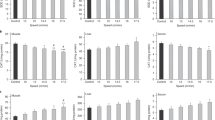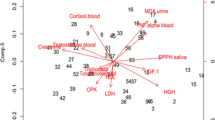Abstract
The energy demand during physical exercise causes an increased oxygen uptake and supply to active tissues, which may increase the rate of free oxygen radical production and thereby affect the capacity of endogenous cellular defense systems. This could result in DNA base modifications, among which 8-hydroxydeoxyguanosine (8OHdG) is one of the most important and has widely been used as a biomarker of in vivo oxidative lesions. Therefore, we examined the effect of regular running exercise on the urinary levels of 8OHdG in 32 long-distance runners and in a group of untrained healthy subjects. The range of 8OHdG in urine was 0.12–6.45 μmol/mol creatinine in both groups, and no significant difference in the mean excretion levels between runners and control probands was observed. This gives no reason to believe that physical exercise in trained individuals may induce a disturbance of the oxidant-to-antioxidant balance.
Similar content being viewed by others
Author information
Authors and Affiliations
Additional information
Accepted: 30 January 1997
Rights and permissions
About this article
Cite this article
Pilger, A., Germadnik, D., Formanek, D. et al. Habitual long-distance running does not enhance urinary excretion of 8-hydroxydeoxyguanosine. Eur J Appl Physiol 75, 467–469 (1997). https://doi.org/10.1007/s004210050190
Issue Date:
DOI: https://doi.org/10.1007/s004210050190




